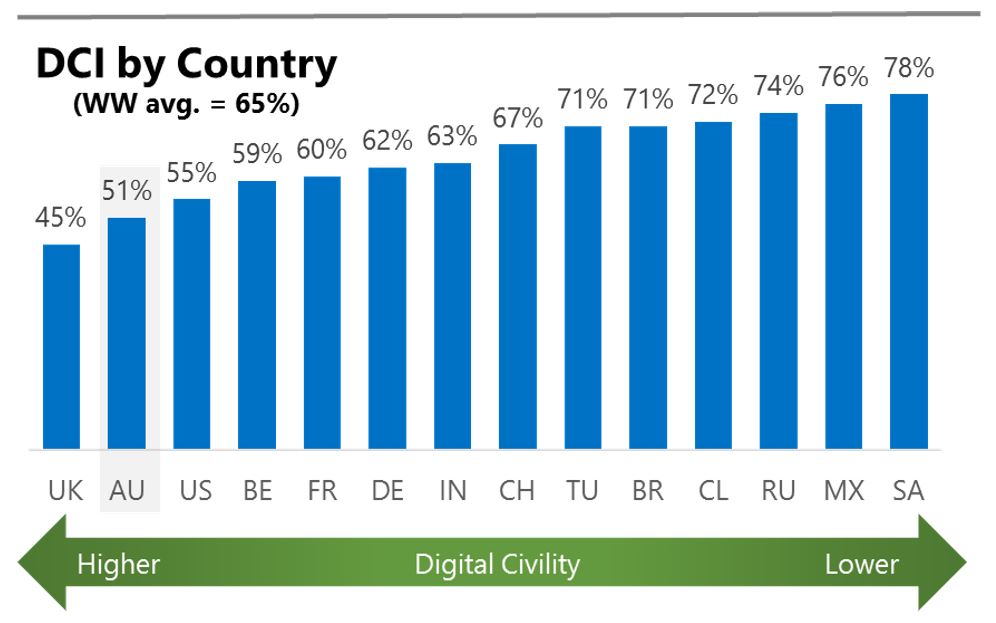The top four ways communities can unite to be more empathetic online
At Microsoft Australia, we are joining our global colleagues to mark Safer Internet Day (SID), an initiative designed to raise awareness of emerging online risks so we can help make the internet a safer and better place – especially children and young people.
As the gap between online and offline continues to blur, and the repercussions of digital interactions become evident, the need for kindness, empathy and a sense of shared responsibility are more important than ever.
The onus to build these respectful environments is on all of us.
Coincidently, this is the theme for SID, “United for a Better Internet.”
As part of our continued support for SID, Microsoft released its inaugural Digital Civility Index (DCI) – insights into the attitudes and perceptions of the internet among teens and adults in 14 countries, including Australia. It measures consumers’ lifetime exposure to online risks.
Digital civility means treating others with respect and dignity online and reducing exposure to security risks and situations that may be compromising or negative in nature.
In our new Index, Australia is performing well when it comes to digital civility, ranked second only behind the UK. 
However, 51 per cent of Australians reported having been exposed to an online risk, be it behavioural, reputational, sexual or personal in nature – with almost a quarter (23 per cent) taking place within the past month.
This means we cannot afford to rest on our laurels because the volume of exposure to online risk is still far too high.
The study found vast emotional and physical repercussions of negative online interactions are being felt by nearly two-thirds of Australians who reported a consequence from exposure.
The most common consequence from online risk exposure was people becoming less trusting of others with a loss of trust both online (30 per cent) and offline (27 per cent). As a result, people tended to become more stressed and withdrawn.
With reliance on technology growing, the current online environment is not sustainable – as explained by the Australian Federal Police (AFP), which is one of the organisations Microsoft Australia is working with to foster an improved culture of digital civility.
At Microsoft, we’re focused on partnering with local organisations to help better educate the community.
This includes ThinkUKnow – a partnership between the AFP, Microsoft Australia, Datacom, and Commonwealth Bank of Australia – a free cyber-safety program providing accessible education to parents, carers and teachers across Australia.
Digital civility is a collective effort. In an attempt to put empathy more front and centre in digital dialogues, we’re introducing Microsoft’s Digital Civility Challenge. Specifically, we’re encouraging individuals to:
- Live the Golden Rule by acting with empathy, compassion and kindness in every interaction, and treating everyone they connect with online with dignity and respect.
- Respect differences and honour diverse perspectives, and when disagreements surface to engage thoughtfully, and avoid name-calling and personal attacks.
- Pause before replying to things people disagree with, and not posting or sending anything that could hurt someone else, damage reputations or threaten people’s safety.
- Stand up for myself and others by supporting those who are targets of online abuse or cruelty, reporting activity that threatens anyone’s safety, and preserving evidence of inappropriate or unsafe behaviour.
With these practices in mind, today, on Safer Internet Day (SID), Microsoft is calling all people around the world to embrace “digital civility” and treat each other with respect and dignity – online and offline.
It’s our hope policymakers, companies, and consumers will consider the need for a more respectful internet and leverage the evidentiary base for a global push toward “digital civility.”
We have a way to go, but inclusiveness and kindness is a great place to start.
















